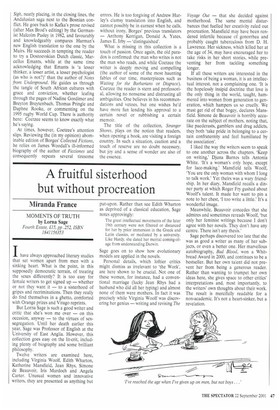A fruitful sisterhood but without procreation
Miranda France
MOMENTS OF TRUTH by Lorna Sage Fourth Estate, £15, pp .252, ISBN 1841156353 Ihave always approached literary studies that set women apart from men with a sinking heart. What is the point, in this supposedly democratic terrain, of treating the sexes differently? It is too easy for female writers to get signed up — whether or not they want it — to a sisterhood of gripes and recriminations. Then they really do find themselves in a ghetto, comforted with Orange prizes and Virago reprints.
But Lorna Sage is such a good writer and critic that she's won me over — on this occasion, anyway — to the virtues of sexsegregation. Until her death earlier this year, Sage was Professor of English at the University of East Anglia. However, this collection goes easy on the lit-crit, including plenty of biography and some brilliant philosophy.
Twelve writers are examined here, including Virginia Woolf, Edith Wharton, Katherine Mansfield, Jean Rhys. Simone de Beauvoir, Iris Murdoch and Angela Carter. Unusual women and innovative writers, they are presented as anything but put-upon. Rather than see Edith Wharton as deprived of a classical education, Sage notes approvingly:
The great intellectual movements of the later 19th century were not filtered or distanced for her by prior immersion in the Greek and Latin classics, or mediated by a university. Like Hardy. she dated her mental coming-ofage from understanding Darwin.
Sage goes on to show how evolutionary models are applied in the novels.
Personal details, which loftier critics might dismiss as irrelevant to 'the Work', are here shown to be crucial. Not one of these women, for instance, had a conventional marriage (lucky Jean Rhys had a husband who did all her typing) and almost none of them were mothers. In fact it was precisely while Virginia Woolf was discovering her genius — writing and revising The Voyage Out — that she decided against motherhood. The same mental disturbances that fuelled her creativity ruled out procreation. Mansfield may have been rendered infertile because of gonorrhea and probably caught tuberculosis from D. H. Lawrence. Her sickness, which killed her at the age of 34, may have encouraged her to take risks in her short stories, while preventing her from tackling something longer.
If all these writers are interested in the business of being a woman, it is an intellectual interest, not a complaining one. 'It is the hopelessly insipid doctrine that love is the only thing in the world, taught, hammered into women from generation to generation, which hampers us so cruelly. We must get rid of that bogey. declares Mansfield. Simone de Beauvoir is horribly accurate on the subject of mothers, noting that, like paederasts, gamblers and drug addicts, they both 'take pride in belonging to a certain confraternity and feel humiliated by the association'.
I liked the way the writers seem to speak to one another across the chapters. 'Keep on writing,' Djuna Barnes tells Antonia White. 'It's a woman's only hope, except for lace-making.' Mansfield tells Woolf, 'You are the only woman with whom I long to talk work.' Yet theirs was a wary friendship. In her diary, Mansfield recalls a dinner party at which Roger Fry gushed about Wooifs talent. It made her want to pin a note to her chest, 'I too write a little.' It's a wonderful image.
Meanwhile, Beauvoir concedes that she admires and sometimes rereads Woolf, tut only her feminist writings because I don't agree with her novels. They don't have any centre. There isn't any thesis.'
Sage perhaps discovered too late that she was as good a writer as many of her subjects, or even a better one. Her marvellous autobiography, Bad Blood, won a Whitbread Award in 2000, and continues to be a bestseller. But her own talent did not prevent her from being a generous reader. Rather than wanting to trumpet her own ideas here, she gives space to other critics' interpretations and, most importantly, to the writers' own thoughts about their work. The result is mercifully readable for a non-academic. It's not a heart-sinker, but a revelation.










































































 Previous page
Previous page